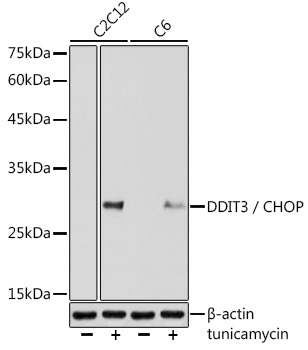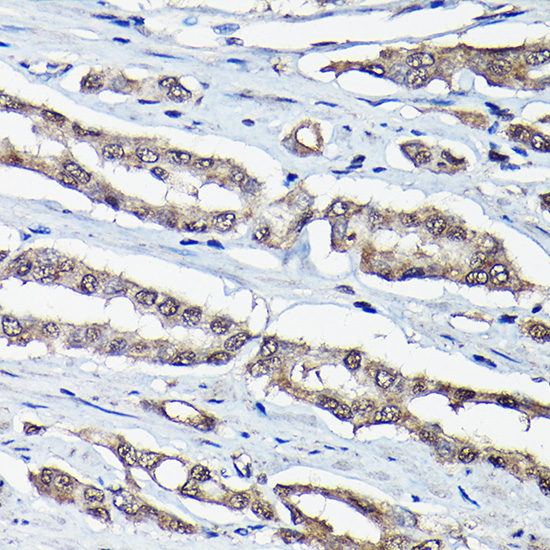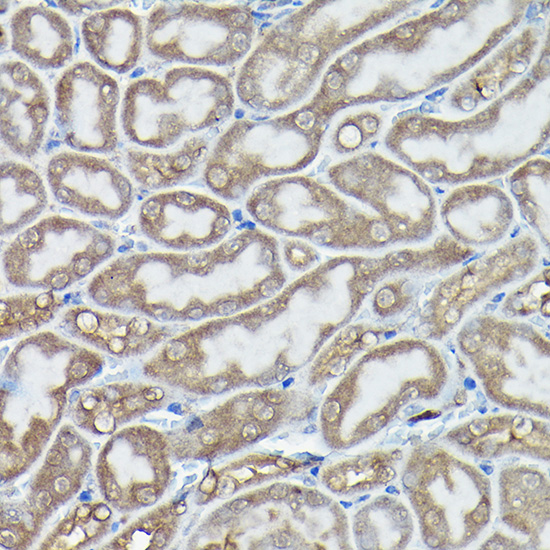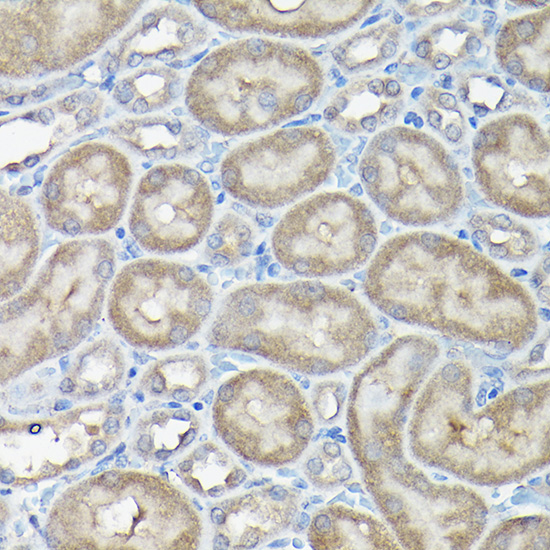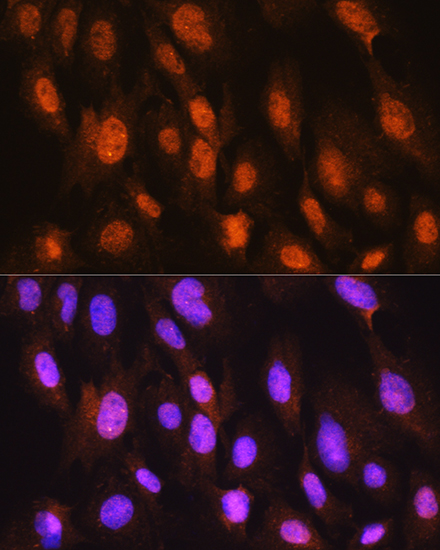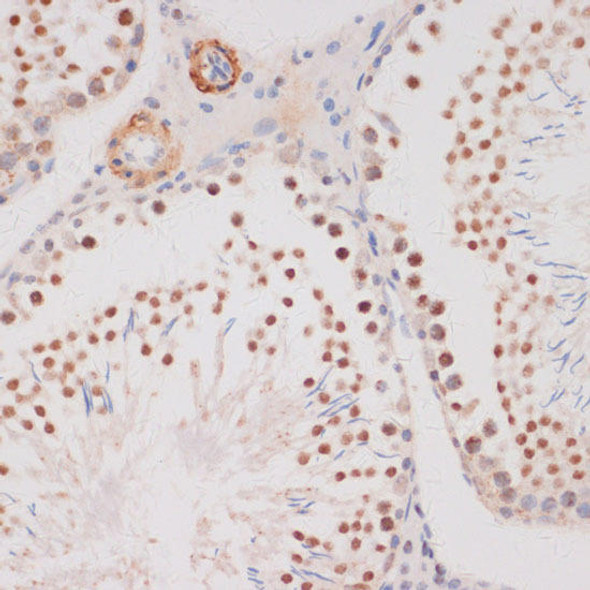Anti-DDIT3 / CHOP Antibody (CAB6504)
- SKU:
- CAB6504
- Product type:
- Antibody
- Reactivity:
- Human
- Mouse
- Rat
- Host Species:
- Rabbit
- Isotype:
- IgG
- Antibody Type:
- Polyclonal Antibody
- Research Area:
- Cell Death
Description
| Antibody Name: | Anti-DDIT3 / CHOP Antibody |
| Antibody SKU: | CAB6504 |
| Antibody Size: | 20uL, 50uL, 100uL |
| Application: | WB IHC IF |
| Reactivity: | Human, Mouse, Rat |
| Host Species: | Rabbit |
| Immunogen: | Recombinant protein of human DDIT3 / CHOP |
| Application: | WB IHC IF |
| Recommended Dilution: | WB 1:500 - 1:2000 IF 1:50 - 1:200 IHC 1:50 - 1:200 |
| Reactivity: | Human, Mouse, Rat |
| Positive Samples: | C2C12, C6 |
| Immunogen: | Recombinant protein of human DDIT3 / CHOP |
| Purification Method: | Affinity purification |
| Storage Buffer: | Store at -20°C. Avoid freeze / thaw cycles. Buffer: PBS with 0.02% sodium azide, 50% glycerol, pH7.3. |
| Isotype: | IgG |
| Sequence: | Email for sequence |
| Gene ID: | 1649 |
| Uniprot: | P35638 |
| Cellular Location: | Cytoplasm, Nucleus |
| Calculated MW: | 19kDa/21kDa |
| Observed MW: | 30KDa |
| Synonyms: | DDIT3, CEBPZ, CHOP, CHOP-10, CHOP10, GADD153, C/EBPzeta, DDIT3 / CHOP |
| Background: | This gene encodes a member of the CCAAT/enhancer-binding protein (C/EBP) family of transcription factors. The protein functions as a dominant-negative inhibitor by forming heterodimers with other C/EBP members, such as C/EBP and LAP (liver activator protein), and preventing their DNA binding activity. The protein is implicated in adipogenesis and erythropoiesis, is activated by endoplasmic reticulum stress, and promotes apoptosis. Fusion of this gene and FUS on chromosome 16 or EWSR1 on chromosome 22 induced by translocation generates chimeric proteins in myxoid liposarcomas or Ewing sarcoma. Multiple alternatively spliced transcript variants encoding two isoforms with different length have been identified. |
| UniProt Protein Function: | CHOP: a transcriptional-regulatory protein of the bZIP family. Inhibits the DNA-binding activity of C/EBP and LAP by forming heterodimers that cannot bind DNA. May play an important role in melanoma progression. CK2-mediated phosphorylation inhibits its transcriptional activity. Up-regulates IL-6 transcription by trapping negative regulating NF-IL6 isoform. |
| UniProt Protein Details: | Protein type:Autophagy; Oncoprotein; Transcription factor; DNA-binding Chromosomal Location of Human Ortholog: 12q13.1-q13.2 Cellular Component: cytosol; nucleoplasm; nucleus Molecular Function:cAMP response element binding protein binding; DNA binding; leucine zipper domain binding; protein binding; protein heterodimerization activity; protein homodimerization activity; transcription corepressor activity; transcription factor activity; transcription factor binding Biological Process: cell cycle arrest; cell redox homeostasis; inhibition of CREB transcription factor; mRNA transcription from RNA polymerase II promoter; negative regulation of protein kinase B signaling cascade; negative regulation of transcription factor activity; negative regulation of transcription from RNA polymerase II promoter; negative regulation of transcription, DNA-dependent; positive regulation of interleukin-8 production; positive regulation of neuron apoptosis; positive regulation of transcription from RNA polymerase II promoter; positive regulation of transcription, DNA-dependent; proteasomal ubiquitin-dependent protein catabolic process; regulation of transcription in response to stress; regulation of transcription, DNA-dependent; response to DNA damage stimulus; response to unfolded protein Disease: Myxoid Liposarcoma |
| NCBI Summary: | This gene encodes a member of the CCAAT/enhancer-binding protein (C/EBP) family of transcription factors. The protein functions as a dominant-negative inhibitor by forming heterodimers with other C/EBP members, such as C/EBP and LAP (liver activator protein), and preventing their DNA binding activity. The protein is implicated in adipogenesis and erythropoiesis, is activated by endoplasmic reticulum stress, and promotes apoptosis. Fusion of this gene and FUS on chromosome 16 or EWSR1 on chromosome 22 induced by translocation generates chimeric proteins in myxoid liposarcomas or Ewing sarcoma. Multiple alternatively spliced transcript variants encoding two isoforms with different length have been identified. [provided by RefSeq, Aug 2010] |
| UniProt Code: | P35638 |
| NCBI GenInfo Identifier: | 544022 |
| NCBI Gene ID: | 1649 |
| NCBI Accession: | P35638.1 |
| UniProt Secondary Accession: | P35638,F8VS99, |
| UniProt Related Accession: | P35638 |
| Molecular Weight: | 21,700 Da |
| NCBI Full Name: | DNA damage-inducible transcript 3 protein |
| NCBI Synonym Full Names: | DNA damage inducible transcript 3 |
| NCBI Official Symbol: | DDIT3 |
| NCBI Official Synonym Symbols: | CHOP; CEBPZ; CHOP10; CHOP-10; GADD153 |
| NCBI Protein Information: | DNA damage-inducible transcript 3 protein |
| UniProt Protein Name: | DNA damage-inducible transcript 3 protein |
| UniProt Synonym Protein Names: | C/EBP zeta; C/EBP-homologous protein; CHOP; C/EBP-homologous protein 10; CHOP-10; CCAAT/enhancer-binding protein homologous protein; Growth arrest and DNA damage-inducible protein GADD153 |
| Protein Family: | DNA damage-inducible transcript 3 protein |
| UniProt Gene Name: | DDIT3 |
| UniProt Entry Name: | DDIT3_HUMAN |


